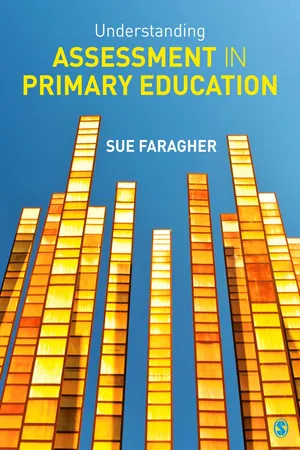
Understanding Assessment in Primary Education
Sue Faragher
- 192 Seiten
- English
- ePUB (handyfreundlich)
- Über iOS und Android verfügbar
Understanding Assessment in Primary Education
Sue Faragher
Über dieses Buch
Understanding assessment and being able to use it effectively is at the heart of successful primary teaching. Aware of current policy and research, this book looks at the role and purpose of assessment within education, as well as providing detailed practical guidance on the main types of classroom assessment, including formative, summative, formal and informal methods.
Real classroom examples and activities illustrate the practical uses, benefits, and limitations of each form of assessment, enabling you to feel confident about implementing these strategies in your own teaching.
Coverage includes:
- The assessment planning cycle
- Innovative forms of assessment, including portfolios, debates, role play and mind mapping
- Assessment of learners with diverse needs, including SEN and EAL
- The use of technology in assessment
- Engaging children through self-assessment and peer-assessment
This is essential reading for all primary initial teacher education courses, including university-based (PGCE, PGDE, BA QTS, BEd), school-based (SCITT, School Direct, Teach First) and employment-based routes into teaching, and beginning teachers.
Sue Faragher is Head of Al Basma British School, a large private school in Abu Dhabi.
Häufig gestellte Fragen
Information
Inhaltsverzeichnis
- Cover
- Half Title
- Publisher Note
- Title Page
- Copyright Page
- Acknowledgements
- Contents
- Illustration List
- About the Author
- Acknowledgements
- Introduction
- Chapter 1 Introduction to the Principles of Assessment
- Chapter 2 Standards-driven Assessment Culture
- Chapter 3 Assessing the Progress of Pupils in the Early Years
- Chapter 4 Assessing Pupils with Special Educational Needs
- Chapter 5 Learning through Assessment
- Chapter 6 Self- and Peer Assessment
- Chapter 7 Using Observations and Mind Mapping
- Chapter 8 Using Questioning, Explaining, Circle Time and Debates
- Chapter 9 Reports, Role Play, Posters, Learning Journals and Portfolios
- Chapter 10 The Use of ICT in Assessment
- Chapter 11 Feedback, Recording and Reporting
- Conclusion
- References
- Index